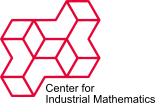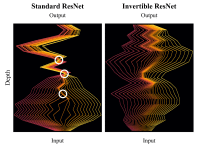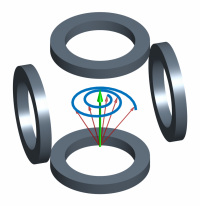WG Industrial Mathematics
Administration: Prof. Dr. Dr. h.c. Peter Maaß
The working group industrial mathematics covers a broad field of research and application from life sciences and engineering sciences. The mathematical research focuses on- Inverse problems
- Mathematical image and signal processing
- Deep learning
- Numerical analysis
- Parameter identification
Teams
The most important fields of application are imaging mass spectrometry (MALDI imaging), cutting processes in material developments, and magnetic particle imaging (MPI).The research of the industrial mathematics groups strongly focuses on deep learning, both in fundamental research topics and industrial applications. Among the mathematical projects are e.g. deep learning for inverse problems or invertible neural networks. A highlight of such activities was the organization of an Autumn School on Deep Learning and Inverse Problems (www.zetem.uni-bremen.de/dlip19). Applications are studied in medical imaging, in particular in data-based image reconstruction for computerized tomography, or in tumor classification based on MALDI Imaging. This transfer of novel mathematical deep learning approaches into industrial applications is supported e.g. by events such as the Deep Learning Forum Bremen (www.zetem.uni-bremen.de/romsocdl/dlforum).
Simplified description of MALDI-Imaging technology
In addition to microbiology, botany and pharmacology, the bioinformatics group deals with the use of MALDI imaging in pathological diagnostics. The group cooperates closely with partners from clinical pathology and biomedical research, with the Bremen company Bruker Daltonik, the global market leader for MALDI imaging mass spectrometer, as well as the software company SCiLS, founded in 2013 as a ZeTeM spin-off and meanwhile being a branch office of Bruker.
Since 2016, the industrial mathematics group is also engaged in the mathematical challenges in magnetic particle imaging and enlarges hereby the applied interdisciplinary research in the field of medicine. The tomographic technique of magnetic particle imaging enables to locate iron oxide nanoparticles within human bodies without ionizing. By this, the technique allows to make an inference on e.g. cardiovascular diseases.
Within the project MPI², funded by the Federal Ministry of Education and Research (BMBF), these challenges are to be tackled together with industrial-medical partners by mathematical research to lay the foundations for a clinical application of this technology.



